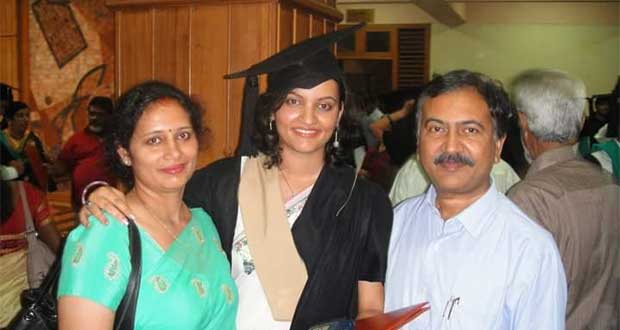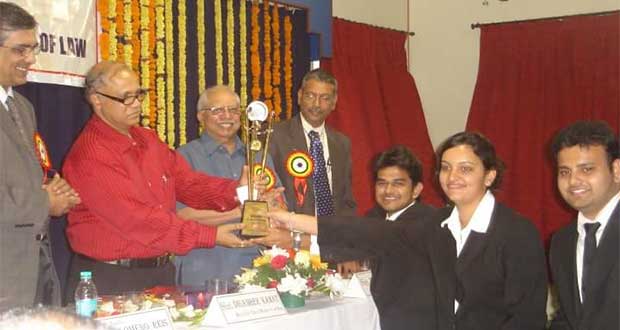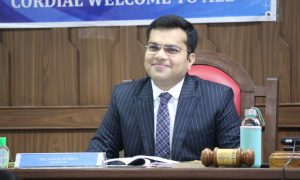Prerna Singh is a graduate from School of Law, Christ University (Batch of 2011). Her internship experiences were quite diverse. She has interned with various prestigious law firms including Trilegal, Dua Associates & LKS. While in law school, she participated in various co-curricular activities and has multiple publications to her name. She was a proactive mooter and has both participated and won a few moot court competitions in law school. Soon after graduation, she started working at SRGR Law Office and thereafter shifter to Archer and Angel, Advocates and Legal Consultants as an Associate. Currently, she works as a Consultant at PricewaterhouseCoopers in Risk Advisory.
In this interview we talk about:
- Her days at Christ College, Bangalore and at various internships
- Her work experience at SRGR Law Offices.
- Her professional shift to Archer and Angel, Advocates and Legal Consultants.
- Working as a Legal Consultant at PricewaterhouseCooper, India.
How would you introduce yourself to our readers? Tell us what motivated you to pursue law as a career.
Well I was born in Bihar and brought up in Jaipur. I did my schooling at The Nest Children Secondary School and India International School in Jaipur, after which I moved to Bangalore to pursue law from Christ College. I am currently working with PricewaterhouseCoopers India at their Mumbai Office as a ‘Consultant’ in their Risk Advisory LoS, prior to which I was working with law firms in Delhi and Mumbai.
That question is particularly of significance in my case because I am the first one and by far the only one to have pursued law as profession in my family. I am not sure if there is this one thing that I could point at as my reason for pursuing law but it wasn’t accidentally for sure. I had taken up science and maths as my core subjects after 10thgrade and was preparing to write engineering entrances and it was in the later part of my 12th grade that I got consciously inclined towards law.
As philosophical as it may sound, I use the term ‘consciously’ because I believe that it must have been there subconsciously long before it came to realisation. I am an avid reader and back in those days used to be majorly hooked on to novels. I used to love reading John Grisham books. Also, it so happened that I would end up spotting a lot of articles in the newspapers every other day on law as a career option, its prospects, on law schools in India and so on. Around the same time, I also ended up meeting my father’s friend, who had interestingly studied multiple subjects including law and so my obvious question to him as someone who was considering law as a career option but was not absolutely certain about it was – “Having studied subjects from almost every stream, which is your favourite?” and his instant response to that was something to this effect “Law, hands down” and post that answer, I was sure that I wanted to give it a serious shot. Looking back, it feels like all these were ‘omen’ in Paulo Coelho’s terms guiding me towards pursuing law. Today, when I think of it, I cannot place myself in any other profession but law and I cannot thank my parents enough for supporting me in my delayed decision of pursuing law and understanding where I was coming from despite being a science maths student.
Tell us a bit about your days at Christ College, Bangalore?
The five years spent in Bangalore during law school days continue to be my favourite. These five years were crucial being the foundation years of my life and it could not have gotten better than Christ College and Bangalore. I owe hugely to my days in Bangalore for who I am today as a person and feel extremely privileged to have studied at Christ.
Our curriculum in law school was quite hectic and packed back in 2006-2011. We had regular classes from 9 am to 4pm on most days with additional certificate courses and maintaining 85% attendance was mandatory, failing which disciplinary actions, including barring from writing exams were taken. Further, we had multiple assignment submission with stringent deadlines for every subject in each semester, which meant spending time in the library almost every other day post classes, researching and reading up on various subjects. Add to that the weekly presentations for certain subjects and readings for everyday class.
After having this as your regular routine, if you are someone who is active in co-curricular and extracurricular activities such as mooting, debating, writing papers, sports and cultural activities in law school, which I was, one had to stretch even further. Having said that, most classes were made so interesting and interactive that there were days when you could find us in classrooms continuing the discussion with the batch mates and faculty members even post the classes. I for one had started loving that routine, for it was so enriching in more ways than one. Every day spent in law school was a learning that helped me grow both personally and professionally. I can easily and confidently say that my batch (Batch of 2011) was the most privileged one to have been taught by some of the best faculty members across law schools in India.
How were you various internship experiences when in law school?
My internship experiences were quite diverse and inspiring. I used to intern every semester, in fact most of us used to, as a certain number of internships were also mandatory in law school. We used to break after every semester for close to five to six weeks and I preferred utilising every such break by interning. By the end of 5 years, I had 13 internships in total starting from State Human Rights Commission, NGO, company to law firms like Trilegal, Lakshmi Kumaran &Shridharan, Dua Associates, Holla & Holla Advocates and so on.
In your opinion, how important are extra-curricular activities are for a law student? Do you feel these are activities that should left to the discretion of students or be partaken mandatorily?
I personally think co-curricular and extra-curricular activities are quite important and play a huge role in developing a person’s personality and outlook irrespective of whether the person is a law student or not. Having said that, from my personal experience, it is particularly beneficial for a law student to participate in co-curricular activities such as mooting, different styles of debating, writing and presenting papers at various forums for various reasons including improving and enhancing your research, drafting and oratory skills, which are quite important in a lawyer’s life, irrespective of whether you choose to be a corporate lawyer or litigating lawyer. Also, participating and doing well in these activities alongside academics gives you the much needed exposure, increases confidence, adds to your personality and reflects well in your resume. Some of these activities also prepare you for your professional life ahead to a certain extent.
So far as your question on whether these activities should be taken up mandatorily is concerned, I think everyone is grown up enough in law school to know what is good for them and what is not and hence to each their own. However, I would personally recommend everyone to be active in law school and at least take up one such co-curricular/extra-curricular activity that you really like or have always wanted to take up…it could be anything-sports, music, debating, theatre, mooting, publishing papers. Not only for the reasons that I have cited above, but also because this is the ideal time to pursue anything that you are passionate about. Also, I believe one needs some sort of recreation constantly and pursuing extra-curricular/co-curricular activities does not only take care of that but also channelizes your energy in the right direction. For me that activity was mooting and I think I evolved with every moot that I participated in, both, personally and professionally. Also each time I represented my law school and won moot court competitions, it gave me an unmatchable high.
Soon after graduation you joined SRGR Law Offices as an Associate. How did your appointment take place? How would you describe your experience?
By the time I was in my fifth year of law school, I was certain that I wanted to start my career with a law firm- thanks to the multiple internships I had undertaken by then. So I applied to a few law firms in Delhi, SRGR Law Offices being one of them. Subsequently I was called for an interview and soon after that I got an offer to join them.
My first job was at SRGR Law Offices and it was a wonderful experience working there. The partners of the firm are not just extremely knowledgeable but also grounded and approachable. I worked in their general corporate law team and did a lot of work relating to power and infrastructure laws, FDI, FEMA and so on. I also got to do a lot of drafting and reviewing of various commercial agreements. It was a great learning place for me as a fresher.
Generally the first year after graduation is the most defining time of a fresh law graduate. What would you suggest a fresh law graduate should do to hold spirit and utilise the opportunities available?
No matter how well and how many subjects you are taught in law school, your professional life as a lawyer is drastically different from that of law school. As a fresher, it takes time to sink that in. It is important to have an open and positive mind in your first job so as to make your learning optimum. Also, one needs to be patient and treat every job assigned no matter how big or small equally important and give it their best. Being a fresher, one should be particularly dedicated towards work so as to learn extensively and gain the trust of seniors to handle bigger transactions and responsibilities.
Thereafter you left SRGR to join Archer & Angel, Advocates and Legal Consultants. What led to this shift in your professional portfolio?
I was planning on doing my masters in law from the US in early 2012 but decided to defer it by a few years. In the interim, I got an interview call from Archer & Angel, Advocates and Legal Consultants for a position in their Mumbai Office. I was not actively looking to move out but decided to take the interview nevertheless and ended up liking the profile offered to me during my interview. Also, I always wanted to work in Mumbai (it being the financial capital of India and the hub for corporate lawyers) so I decided to take up the opportunity and it was absolutely worth it.
You have published a lot of papers in various prestigious journals. How should one go about writing papers and getting the same published?
The first step towards publishing papers is to identify the broad topics/subjects of your interest and then look for journals that publish papers on those particular subjects. Once you have identified a reputed journal that covers your area of interest, peruse the guidelines and the instructions including the format, style of citation, eligibility and structure well and ensure that you understand and abide by all of it while writing the paper.
It is important to research extensively, narrow down your topic and get the structure and flow of the paper right in your mind so as to execute it. Further, ensure that the content including your view comes out clearly and does not contradict or confuse the reader. It goes without saying that the ideas will flow better and there may be several changes in your draft structure once you start penning down your thoughts and incorporating it in your paper/article. Nevertheless, it’s always good to have a basic draft structure in place before you start, no matter how many revisions it may have to go through eventually.
So far as getting your work published is concerned, different journals/publications have different criteria for selection. Some journals may require you to submit an abstract of your paper first, review the same and then decide whether they would like you to work on the complete paper. The word limit of these abstracts could vary anywhere from 200 to 500 words for different journals. Then, there are journals, which would straight away want to review your paper on the topic and decide whether they would want to publish it or revert with their comments and suggest revising the paper or discard it outright.
How did paper publishing and other co-curricular activities help you in acquiring skills that are important for a successful legal career?
Mooting, publishing papers and presenting papers at various national and international conferences have helped me tremendously in my legal career. I would like to reiterate that research, drafting and oratory skills are extremely important in the legal profession and my active participation in these co-curricular activities have most definitely helped me in enhancing these skills and my knowledge base. Also, participating in these activities makes you a more confident person and lets confess it one certainly enjoys the laurels and recognition that comes along with it. Last but not the least, in hindsight I realise that having these credentials in your resume leave an impact on the recruiters as one can gauge a lot about you as a person, your skills, your strength, motivation, personality, interests, efforts and characteristics through the activities that interest you. Separately, for those who are planning on doing their LL.M from abroad, having these credentials in your application certainly makes a difference and gives you an edge over others.
Currently you work as a Legal Consultant at PricewaterhouseCoopers, India. What made you choose this particular avenue? How did your appointment at PwC take place?
Having worked for close to three years with law firms, I was keen on exploring the work culture and work profile offered to lawyers at consultancy firms. Last year, I decided to make a shift from law firm and sent my application to a few consultancy firms. I was fortunate enough to receive a call for interview from PwC, Mumbai where I had three rounds of interview within two weeks, out of which the last round was with the partner, post which I was made an offer to join PwC.
We would love to hear about your work profile. What is a normal workday like?
I am a part of the Risk Advisory team at PwC. My work profile includes setting up of compliance framework for clients from different sectors, drafting of governance level policies for different clients, reviewing agreements for clients across sectors, identification of risks (legal and commercial) and advising on risk mitigation and so on. My work profile constitutes a good mix of research and drafting. It also includes meeting and interacting with clients, understanding their business needs, models and operations in order to add value and deliver well.
Every day at work is unpredictable which is what makes it both challenging and interesting. There is a lot of multitasking required on a daily basis as you may be working on multiple projects/assignments at a time. Therefore, time management is crucial as there are stringent deadlines to be met more often than not and you have to be on your feet constantly.
Are you allowed to interact with clients?
Yes, as stated earlier I am allowed to interact with clients. In fact meeting and interacting with clients, understanding their business needs, models and operations is a part of my work profile.
Tell us about a pinnacle case which you were a part of. What steps do you take to prepare for a difficult case?
I cannot discuss a specific case for more reasons than one, including confidentiality of course. However, there are multiple challenging instances that you are faced with on a regular basis and it feels good to look back and know that you handled it well and tactfully.
I personally think that no matter how hard you try, you cannot really prepare in advance for a difficult case (except may be begin your research in advance) unless it is a repeat and if it is a repeat then it is no longer difficult! Different assignments may pose different challenges and not all challenges can be apprehended in advance, so more often than not you are required to think on your feet when faced with an assignment specific challenge.
How do you keep yourself abreast with latest industry news and trends?
I try and spend at least half an hour every day browsing through legal blogs and news websites etc. to keep myself abreast with latest industry news and updates. Also, being a part of the industry, you end up having a lot of friends, peers and batch mates working in different sectors, law firms etc. and end up knowing important updates from each other, which is quite helpful. Being a lawyer, the nature of your work also demands a lot of reading for different assignments and you inadvertently end up knowing things.
What were the biggest hurdles and challenges in the first few months? How did you deal with them?
Once you have worked for a couple of years, the challenge is not so much in understanding your work and deliverables but in understanding how the organisation that you work for, functions. Therefore, just like in any other organisation, a substantial amount of time was spent in understanding the protocols at PwC in the first few months. This exercise is also important as things at work become easy and smooth after that.
What is the procedure to apply for recruitment at PwC?
You could visit the career section on the website, look out for the relevant vacancy and apply online by creating an account and filling in your details. If shortlisted, the Human Capital team of PwC will revert to you after screening your application.
Is there any other tip you would like to give to our budding professionals?
Once you have chosen law as your career, be certain of the line of practice that you would want to pursue after graduating (be it litigation, academia, law firm, in-house counsel, LPO or anything else). Internships and frequent interactions with your seniors and professors will help you identify your area of interest. Therefore, it is important to take internships seriously in law school and try and explore as much during the tenure.
Once you have identified your area of interest (which you may in all probability by the end of fourth year in law school), you should then try and work towards it by streamlining your remaining internships. Also, every fresher entering the profession should avoid having preconceived notions and give it some time to get acclimatised to the work life. It is important to have an open mind to enhance learning and treat every work equally important, no matter how big or small. Reading regularly and keeping yourself abreast with latest amendments and change in law is extremely crucial for a lawyer and so inculcating the habit of reading in early days of your career will be useful. As learning is a continuous journey, it is important to take your profession seriously and work continuously towards increasing your knowledge base.


























